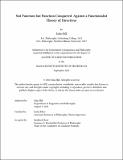| dc.contributor.advisor | Khoo, Justin | |
| dc.contributor.author | Hill, John | |
| dc.date.accessioned | 2024-12-18T18:18:16Z | |
| dc.date.available | 2024-12-18T18:18:16Z | |
| dc.date.issued | 2024-09 | |
| dc.date.submitted | 2024-12-16T20:10:23.671Z | |
| dc.identifier.uri | https://hdl.handle.net/1721.1/157880 | |
| dc.description.abstract | Ordering, requesting, and inviting are examples of directive speech acts. Philosophers have offered different accounts of what it is to perform a directive, which they have developed using different theoretical resources. Attitudinal theories of speech acts try to explain what it is to perform a directive in terms of a speaker’s beliefs, desires, and intentions. Nonattitudinal theories of speech acts try to explain directives in terms of something else.
This thesis is concerned with functionalism, a nonattitudinal theory of speech acts. According to functionalism, performing a directive is making an utterance with the etiological function of causing hearers to act in response to one’s utterance. I argue that functionalism is false. I develop counterexamples that show functionalism is too permissive about the kinds of causation suitable for generating directives. I argue further that the most plausible way to address these counterexamples is to become more attitudinal: rather than be permissive, functionalism should hold that directives and hearers’ responses to them are caused by specific internal processes. | |
| dc.publisher | Massachusetts Institute of Technology | |
| dc.rights | In Copyright - Educational Use Permitted | |
| dc.rights | Copyright retained by author(s) | |
| dc.rights.uri | https://rightsstatements.org/page/InC-EDU/1.0/ | |
| dc.title | Not Function but Function Conquered: Against a Functionalist Theory of Directives | |
| dc.type | Thesis | |
| dc.description.degree | S.M. | |
| dc.contributor.department | Massachusetts Institute of Technology. Department of Linguistics and Philosophy | |
| mit.thesis.degree | Master | |
| thesis.degree.name | Master of Science in Philosophy | |
